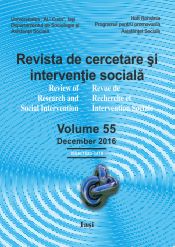COMPARISONS OF EMOTIONAL AND BEHAVIORAL PROBLEMS REPORTED BY PARENTS AND TEACHERS IN THREE ETHNIC GROUPS LIVING IN ROMANIA: A PILOT STUDY
COMPARISONS OF EMOTIONAL AND BEHAVIORAL PROBLEMS REPORTED BY PARENTS AND TEACHERS IN THREE ETHNIC GROUPS LIVING IN ROMANIA: A PILOT STUDY
Author(s): Adrian V. Rus, Elena-Adriana Tomuletiu, Sheri R. Parris, Jacquelyn S. Pennings, Rebecca WebsterSubject(s): Behaviorism, Ethnic Minorities Studies, Sociology of Education
Published by: Expert Projects Publishing
Keywords: social problems; behavioural problems; emotional problems; Romania; children; Romanian; Hungarian; Roma;
Summary/Abstract: The goal of the present study was to measure the level of inter-observer (parents/guardians vs. teachers) agreement regarding children’s social, emotional, and behavioural problems assessed through parent and teacher reports belonging to Romanian, Hungarian, and Roma ethnic groups living in Romania. Overall, 467 children were selected for the current study with a mean age of 11 years (SD = 3.78), ranging between 6 and 18 years. Of these, 248 (53.1%) were females, and 219 (46.9%) were males. In addition, 302 (64.7%) were identified as Romanian by their guardians, 136 (29.1%) as Hungarian, and 29 (6.2%) as Roma. Of the guardians, 400 (85.7) identified themselves as biological parents of the children; 24 (5.1%) as adoptive, foster, or step parents; and 43 (9.2%) declined to reveal their status and/or missed this information. Concerning the teachers, 378 (80.9%) were females, 66 (14.1%) were males, and 23 (4.9%) declined to reveal their gender and/or missed this information. The results showed that parents’ assessments (CBCL/6-18) had significantly higher scores (more unfavourable) than teachers’ assessments (TRF) for Romanian and Hungarian children and these results are comparable with previous published research. Surprisingly, Roma children’s parents scored them statistically significantly lower (more favourably) than did their teachers, suggesting that parents could have different decision thresholds with regard to identifying behavioural problems in Roma children.
Journal: Revista de Cercetare şi Intervenţie Socială
- Issue Year: 2016
- Issue No: 55
- Page Range: 63-79
- Page Count: 18
- Language: English

